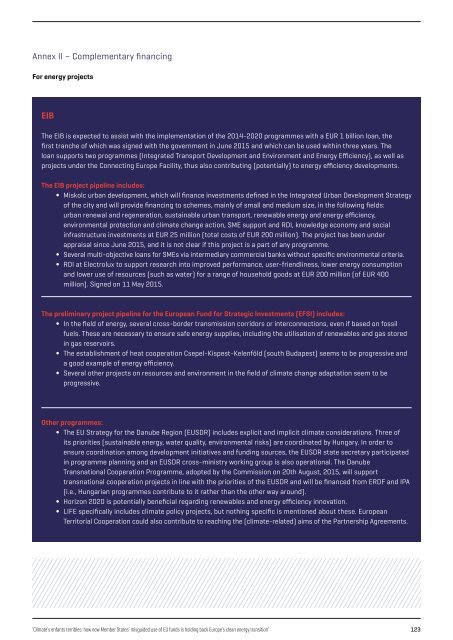ENFANTS TERRIBLES
enfants-terribles
enfants-terribles
Create successful ePaper yourself
Turn your PDF publications into a flip-book with our unique Google optimized e-Paper software.
Annex II – Complementary financing<br />
For energy projects<br />
EIB<br />
The EIB is expected to assist with the implementation of the 2014-2020 programmes with a EUR 1 billion loan, the<br />
first tranche of which was signed with the government in June 2015 and which can be used within three years. The<br />
loan supports two programmes (Integrated Transport Development and Environment and Energy Efficiency), as well as<br />
projects under the Connecting Europe Facility, thus also contributing (potentially) to energy efficiency developments.<br />
The EIB project pipeline includes:<br />
• Miskolc urban development, which will finance investments defined in the Integrated Urban Development Strategy<br />
of the city and will provide financing to schemes, mainly of small and medium size, in the following fields:<br />
urban renewal and regeneration, sustainable urban transport, renewable energy and energy efficiency,<br />
environmental protection and climate change action, SME support and RDI, knowledge economy and social<br />
infrastructure investments at EUR 25 million (total costs of EUR 200 million). The project has been under<br />
appraisal since June 2015, and it is not clear if this project is a part of any programme.<br />
• Several multi-objective loans for SMEs via intermediary commercial banks without specific environmental criteria.<br />
• RDI at Electrolux to support research into improved performance, user-friendliness, lower energy consumption<br />
and lower use of resources (such as water) for a range of household goods at EUR 200 million (of EUR 400<br />
million). Signed on 11 May 2015.<br />
The preliminary project pipeline for the European Fund for Strategic Investments (EFSI) includes:<br />
• In the field of energy, several cross-border transmission corridors or interconnections, even if based on fossil<br />
fuels. These are necessary to ensure safe energy supplies, including the utilisation of renewables and gas stored<br />
in gas reservoirs.<br />
• The establishment of heat cooperation Csepel-Kispest-Kelenföld (south Budapest) seems to be progressive and<br />
a good example of energy efficiency.<br />
• Several other projects on resources and environment in the field of climate change adaptation seem to be<br />
progressive.<br />
Other programmes:<br />
• The EU Strategy for the Danube Region (EUSDR) includes explicit and implicit climate considerations. Three of<br />
its priorities (sustainable energy, water quality, environmental risks) are coordinated by Hungary. In order to<br />
ensure coordination among development initiatives and funding sources, the EUSDR state secretary participated<br />
in programme planning and an EUSDR cross-ministry working group is also operational. The Danube<br />
Transnational Cooperation Programme, adopted by the Commission on 20th August, 2015, will support<br />
transnational cooperation projects in line with the priorities of the EUSDR and will be financed from ERDF and IPA<br />
(i.e., Hungarian programmes contribute to it rather than the other way around).<br />
• Horizon 2020 is potentially beneficial regarding renewables and energy efficiency innovation.<br />
• LIFE specifically includes climate policy projects, but nothing specific is mentioned about these. European<br />
Territorial Cooperation could also contribute to reaching the (climate-related) aims of the Partnership Agreements.<br />
‘Climate’s enfants terribles: how new Member States’ misguided use of EU funds is holding back Europe’s clean energy transition’ 123


